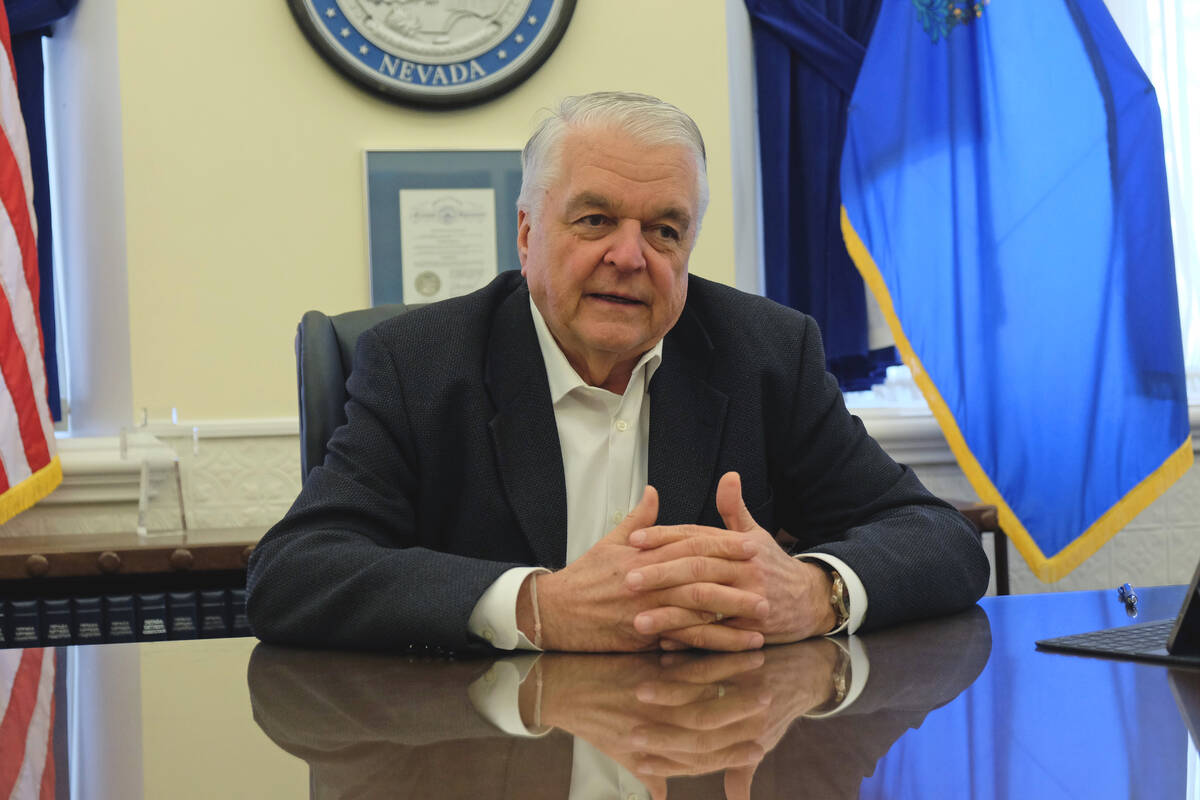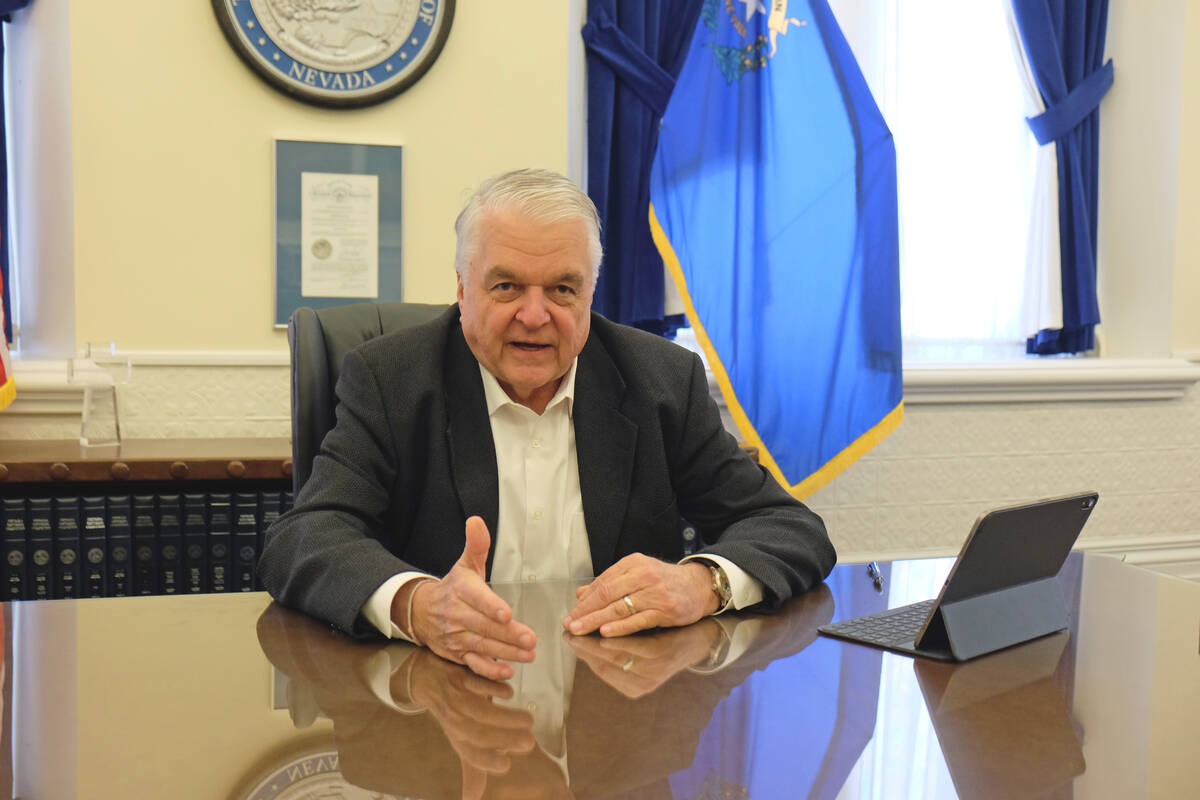Gov. Sisolak hopeful for Nevada’s quick recovery
CARSON CITY — With the two-year-old pandemic ebbing but not over and the state economy rebounding unevenly, Gov. Steve Sisolak took to Allegiant Stadium this week for a speech that he says “gave us an opportunity to let folks know what our priorities are” as Silver State life returns however haltingly to normal.
Delivering what he billed as an off-year State of the State address — a ritual that typically introduces Nevada’s odd-year-only legislative sessions — Sisolak in just over 20 minutes Wednesday laid out plans to spend more than $1.2 billion in pandemic aid, part of the overall $6.7 billion that the state, its schools and local governments have received via two federal aid packages since the pandemic struck in 2020.
“We’re facing a difficult situation now, good in some areas and difficult in others,” the governor said in a post-speech interview Thursday in the Capitol. “But with inflation and with Ukraine and what not, people are concerned. It’s been now two weeks since I lifted the mask mandate. People want to know where we stood on COVID and where we’re moving forward.”
“People want to know, we’ve had all this federal money that’s come into the state and they’re not hearing enough about where do we spend it,” Sisolak said. “‘What are you doing with that, governor? Where are we going to invest our money, spend our money.’”
His detractors took a different view. Seeking re-election this year, Sisolak was quickly called out by Republican opponents, both potential challengers for governor and state officeholders, for using the speech to dole out money at the rate of about $60 million a minute.
“Spending money is not leadership,” Senate Minority Leader James Settelmeyer, R-Minden, said in the official Republican response to the governor. “This money will be spent to grow the government size but with no thought of how to fund that growth when the money is gone.”
Sisolak said he chose the $1.9 billion stadium for his venue as “a symbol, particularly in Southern Nevada, of the economic recovery. It created thousands of jobs, both construction and ongoing permanent jobs.”
Reno lawyer Joey Gilbert, a Republican candidate for governor and perhaps Sisolak’s most fiery critic, issued a harangue on Thursday attacking the speech point by point. Given the governor’s “false claims, omissions, and unrealistic mention of a never-gonna-happen second term,” Gilbert said, “a more appropriate venue would have been Disney’s Fantasyland.”
Spending aid money
Sisolak on Wednesday pledged $500 million to statewide affordable housing initiatives to create thousands of new homes, preserve thousands more, help middle-income Nevadans in the state’s red-hot housing market and subsidize expenses to help thousands of seniors keep homes they have.
Also on the funding list: $500 million to expand high-speed internet — a priority that emerged in the uneven home-schooling period of the pandemic — and $160 million to subsidize child care for families and providers.
Those funds will be drawn from about $1.9 billion remaining in pandemic aid the state can allocate at its discretion. Where and how to spend it, Sisolak said, came from the monthslong public outreach state officials conducted last year.
“We listened to different suggestions that were brought forward, ideas that were submitted in the (online) portal, and affordability of housing was one of the main ones that we got,” the governor said. “I think is going to help us not just on the affordability of the home, but also keeping people from becoming homeless.”
Some sought-after programs “would require a great deal of ongoing support, and we couldn’t do that,” Sisolak said. Housing and infrastructure projects create jobs, he said, “and we’re going to be able to employ people at the same time and not have to worry about how we’re going to pay for that a little bit down the line.”
Lowering drug costs
Other proposals call for the state to join Oregon and Washington in the Northwest Prescription Drug Consortium to buy prescription drugs at lower cost, an initiative that can implemented faster than the longer-term work on housing and broadband.
Sisolak also said the state would use federal aid to provide free school lunches, expand free community college and apprentice eligibility.
He said he would propose raises for state police officers next year if re-elected, potentially their first pay increase since 2006.
“We got a big problem with the state police in that we’re ending up being a training ground for all the other departments across the state,” Sisolak said. Officers join the force, stay for a year or two, then move to another department where the pay can be 30-40 percent higher, he said.
After rocky negotiations with the Sisolak administration, a newly formed police union last year quickly endorsed one of his Republican opponents, former Sen. Dean Heller. Sisolak, who signed a bill giving collective bargaining rights to state workers who previously did not have them, said the endorsement didn’t matter to him.
“We’ve had a huge hemorrhaging of talent from the state police, and we need to do something to stop that it,” he said. “Whoever they decide to endorse is up to them. This is something that’s right to do and I feel strongly about it.”
Pandemic ‘not over’
Though he lifted state mask mandates two weeks ago, Sisolak said the pandemic is “definitely not over,” and hence neither is the state of emergency he declared at the outset to combat. Case numbers are dropping, but “we’re still seeing too many cases.”
“We’ve still got to get hospitalizations down a little bit more,” he said. “We took the masks off two weeks ago. … I’d like to get a couple more weeks under our belt and let’s see how the numbers continue hopefully to go down.”
Explaining his optimism, he said that in discussions with other governors, Nevada is “recovering faster than other states are.”
“That being said, we plummeted faster than a lot of other states did, too,” he added. “But we’re coming back very, very quickly.”
The hospitality and gaming industries have rebounded, employment and bookings for conventions and tourism are up, businesses are optimistic, he said.
“I think it came back much faster than people had anticipated it would come back. And that’s given me hope.”
Contact Capital Bureau reporter Bill Dentzer at bdentzer@reviewjournal.com. Follow @DentzerNews on Twitter.



